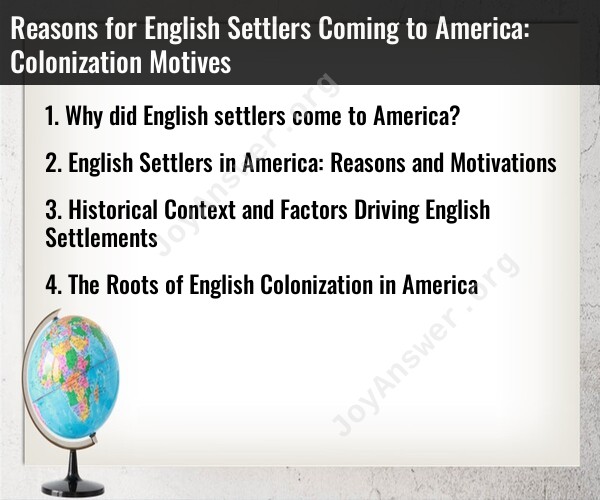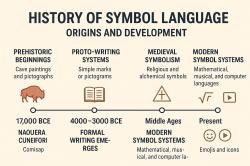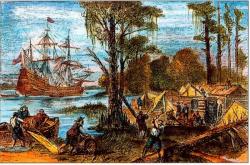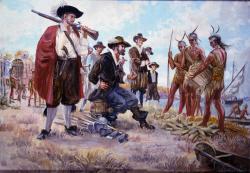Why did English settlers come to America?
English settlers came to America for a variety of reasons, and these motivations evolved over time as different groups of settlers arrived. Here are some of the primary reasons for English colonization in America:
Economic Opportunities: One of the most significant factors driving English colonization was the prospect of economic gain. Settlers sought to establish profitable enterprises in the New World, such as farming, fishing, fur trading, and the production of valuable goods like tobacco.
Religious Freedom: Many English settlers were motivated by a desire for religious freedom. Some groups, such as the Pilgrims and the Puritans, sought to escape religious persecution and establish their own communities where they could practice their faith freely.
Escape from Political and Social Turmoil: Political instability and social upheaval in England, including the English Civil War, drove some individuals to seek refuge in the American colonies. These settlers were often looking for a more stable and peaceful life.
Adventure and Exploration: Some early settlers, including explorers, adventurers, and entrepreneurs, were drawn to the idea of exploring and conquering new lands. They sought to expand the influence of the English Crown and potentially discover valuable resources.
Land Ownership: In America, land was more readily available and less expensive than in England. Many settlers were attracted by the opportunity to acquire land and establish their own farms or plantations.
Trade and Commerce: The English established trading posts and colonies to facilitate trade with Native American tribes and other European powers. The potential for profit through the fur trade and the exchange of goods was a significant motivator.
Transportation of Convicts: In the 17th and 18th centuries, England began sending convicts to America as a form of punishment. This practice helped alleviate prison overcrowding in England and contributed to the settlement of the American colonies.
Social Mobility: Some settlers sought the chance to improve their social and economic status, as the rigid class structure in England was less pronounced in the colonies. The New World offered opportunities for upward mobility.
Family and Community Building: English settlers often came with their families and sought to build new communities and societies in the New World, where they could practice their own customs and traditions.
Colonial Ambitions: The English government had colonial ambitions and saw the establishment of colonies as a way to expand its empire and compete with other European powers in the race for overseas territories.
It's important to note that the motivations for English colonization in America varied greatly among individuals and groups. Different colonies, such as Virginia, Massachusetts, and Pennsylvania, had unique motivations and purposes, which contributed to the diversity of the American colonial experience. Over time, these motivations, combined with the contributions of other immigrant groups, played a crucial role in shaping the culture and society of what would become the United States.
English Settlers in America: Reasons and Motivations
There were a variety of reasons and motivations for English settlers to come to America. Some of the most common reasons included:
- Economic opportunity: England was experiencing a period of economic growth and prosperity in the early 1600s, but there were still many people who were living in poverty. America offered the opportunity for people to start new lives and make a better living for themselves.
- Religious freedom: England was a Protestant country at the time, but there were many different Protestant denominations, and not all of them were accepted by the government. Some English settlers came to America to escape religious persecution and to have the freedom to practice their religion as they wished.
- Adventure: Some English settlers came to America simply because they were seeking adventure and a new challenge. They were excited about the prospect of exploring a new land and starting new communities.
Historical Context and Factors Driving English Settlements
The English settlements in America were part of a larger movement of European colonization that took place in the 16th and 17th centuries. The Europeans were motivated to colonize the Americas by a variety of factors, including:
- The search for new trade routes: The Europeans were eager to find new trade routes to Asia, where they could obtain valuable spices and other goods. America was seen as a potential gateway to Asia.
- The desire for new resources: The Europeans were also interested in exploiting the natural resources of the Americas, such as gold, silver, and furs.
- The spread of Christianity: The Europeans were also motivated by a desire to spread Christianity to the Native Americans.
The Roots of English Colonization in America
The roots of English colonization in America can be traced back to the late 15th century, when England began to explore the North American coast. In 1497, John Cabot explored the coast of Newfoundland and claimed it for England. In 1584, Walter Raleigh established a colony on Roanoke Island, but the colony failed and the colonists disappeared.
In 1606, King James I granted a charter to the Virginia Company to establish a colony in Virginia. The first permanent English settlement in America was Jamestown, which was founded in 1607. Jamestown was a difficult place to live, and many of the early settlers died of disease and starvation. However, the colony eventually survived and thrived.
Other English colonies were established in the early 17th century, including Massachusetts, Maryland, and Connecticut. The English colonies grew rapidly in the 18th century, and by the time of the American Revolution, there were thirteen English colonies in North America.
Conclusion
The English settlements in America were motivated by a variety of factors, including economic opportunity, religious freedom, adventure, and the desire for new trade routes, resources, and converts to Christianity. The English colonies grew rapidly in the 18th century, and they eventually became the United States of America.













